|
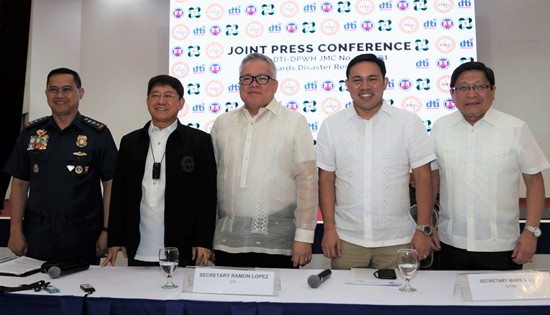
(L-R):
PNP Chief Archie Francisco Gamboa, DILG Secretary Eduardo
Año, DTI Secretary Ramon Lopez, DPWH Secretary Mark Villar,
and MMDA Chair Danilo Lim. |
Selling
substandard products like selling illegal drugs - DTI chief
By
DTI-OSEC-PRU
February 28, 2020
QUEZON CITY –
Department of Trade and Industry (DTI) Secretary Ramon Lopez said
that selling substandard products is like selling illegal drugs
because both activities endanger the lives of Filipinos.
The trade secretary made
this remark during the joint press conference on 26 February 2020
with the Department of Interior and Local Government (DILG) and the
Department of Public Works and Highways (DPWH). The press conference
tackled the DILG-DTI-DPWH Joint Memorandum Circular (JMC) No.
2019-01 on ensuring safe, adaptive, and disaster resilient
communities.
The JMC aims to prepare
the Greater Metro Manila Area (GMMA) for the potential devastation
in the event of “The Big One” – or a magnitude 7.2 earthquake
resulting from the movement of the West Valley Fault.
According to PHILVOLCS OIC
for Earthquake and Earthquake Hazards Ishmael Narag, The Big One can
potentially kill more than 48,000 people and around 24,000 more in
the GMMA.
Under the circular, all
local governments are ordered to assess the structural integrity of
all public and private buildings, facilities if they conform to the
National Building Code of the Philippines.
For his part, Secretary
Lopez assured that the Bureau of Philippine Standards imposes
compliance to the Philippine National Standards, which is aligned
with its international counterparts. The standards for critical
construction materials such as steel, cement, and concrete have also
been developed and reviewed periodically.
“We even made the
procedures stricter in testing standard compliance. For example, we
have adjusted the sampling. Before, we only test three pieces no
matter how large the imported steel shipment. Now, we are conforming
to ISO’s ideal sample size: 50 pieces for 20,000 MT,” said Sec.
Lopez.
He also mentioned
additional inspections for local steel manufacturers. As such, he
said that DTI is collaborating with DILG and the PNP in conducting
surprise inspections on suppliers, wholesalers, and retailers of
construction materials.
“We would have to trace
the sources, the distributors, warehouses, as well as the source of
the manufacturers. To guarantee that substandard materials are kept
out of the market, those who fail to comply with requirements can
face payment of penalties, revocation of permits, and possible
imprisonment,” said Sec. Lopez.
Aside from product
standards, DTI is also coordinating with food manufacturers,
retailers, and distributors to coordinate food supply and delivery
to the GMMA in case of earthquakes and other disasters.
“We asked the food
manufacturers and retailers for their committed supply and
designated areas for delivery in case of natural disasters in the
GMMA. This arrangement will just be triggered and run automatically.
Some of these will be donated and the others will be paid by the
government. We currently have technical working groups finalizing
this arrangement,” said Sec. Lopez.
Re-orient,
overhaul K-12 - ACT
ACT Press Release
February 27, 2020
QUEZON CITY – As
the House Committee on Basic Education and Culture tackles today the
‘long overdue’ review of the K to 12 program, the Alliance of
Concerned Teachers (ACT) Philippines issued its urgent call for the
government to re-orient the Philippine education system towards a
‘nationalist, scientific, and mass-oriented education.’ The group
said that since their long time call for a thorough evaluation of K
to 12 has finally been granted, the government shall take bold
measures to correct the ‘problematic program,’ which will entail a
‘complete overhaul’ in the service of national interests.
“The key issue with the K
to 12 program lies in its core objective, which aims to produce
graduates who are immediately ready to work as semi-skilled and
cheap laborers here and abroad. The program exploits the majority of
impoverished Filipinos for the gain of foreign capital, foregoing
the objective of honing the country’s human resource to serve the
purpose of national industrialization and development,” criticized
ACT Secretary General Raymond Basilio.
Basilio also hit the
curriculum’s removal and weakening of integral subjects for the
development of nationalism and core values among the youth. ACT
cited the removal of Philippine History in high school, the
shortening and simplistic presentation of Araling Panlipunan, the
faulty implementation of the mother tongue-based multilingual
education (MTB-MLE), and the conservative and individualistic
approach to Edukasyon sa Pagpapakatao (EsP).
“These are clear
manifestations of the neoliberal and colonial character of K to 12.
It retards instead of advances the process of molding patriotic
youths whose aspirations are interlinked with that of the entire
nation and who shall later contribute to national development,”
lambasted Basilio.
Further exemplification of
the problematic program, said ACT, can be seen in the curriculum’s
emphasis on producing ‘outputs’ at the expense of the development of
higher-level literacy, critical thought, and scientific approach in
problem solving. The group cited that not only was time allocation
for each subject shortened but an even smaller portion is dedicated
to discussion, while the bigger share of time goes to activities
supposedly meant to exhibit students multiple forms of intelligence.
“K to 12 curriculum was
implemented alongside an array of policies for teachers, which
included a very strict budget of work in our congested daily lesson
logs. Little focus is given to the thorough digestion of lessons as
both students and teachers are pressured to produce multitude of
outputs on a daily basis. Such follows the neoliberal framework of
efficient production in which output is generated at record time for
maximum profit,” said Basilio.
Add to that the spiral
progression approach of the K to 12 curriculum, which ACT claimed
‘messed up and fragmented’ students’ education.
“In the old curriculum, an
entire school year is dedicated for the learning and mastery of
different subjects, which progresses into more complex and advanced
levels as students likewise proceed to higher levels of schooling.
The new curriculum, however, integrates a little of everything
without honing mastery, then immediately moves on to the next field,
all within a single school year. Students will then go through the
same cycle of subjects and fields but with more complex contents in
the following year,” lamented Basilio.
ACT notes that these
issues do not yet mention the haphazard implementation of K to 12
and the government’s failure to provide the budgetary, logistical,
and administrative requirements of the program, which led to a host
of other serious problems such as the worsened shortages in learning
resources, the perennial problem of insufficient classrooms, wanting
training for teachers, lacking education support personnel at the
school level, among others. All these created a substandard quality
of education, which is mostly made up for by overworked and
underpaid public school teachers, added ACT.
ACT also cited the results
of the 2018 Programme for International Student Assessment (PISA),
the National Achievement Test (NAT), and the Philippine Informal
Reading Inventory (Phil-IRI) as proof of the further decline of
education quality under the K to 12 program.
“These are enough causes
for alarm to reorient and overhaul the program, not to mention the
grave injustice and dire consequences of the dismal state of
education to one whole generation of Filipino youth and to our
country. What we need is an education based on Philippine context
and one that responds to the requisites of national development.
Hence, we urge the government to maximize the ongoing review and
finally take the necessary measures to establish an education system
that follows its constitutional mandate of contributing to national
development, instilling patriotism and nationalism, and espousing
total human liberation,” concluded Basilio.
|
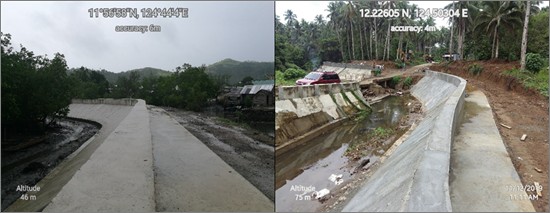
(L)
Gandara River, Barangay Villahermosa Oriental, Pagsanghan,
Samar and (R) Cagpaco Creek, Barangay Sigo, Calbayog City,
Samar. |
DPWH builds two
flood control systems in Samar I
By
CHENZI MAY D. UY
February 27, 2020
CALBAYOG CITY –
Department of Public Works and Highways has completed the
construction of two flood control systems in the first district of
Samar.
One is built along Gandara
River in the adjacent portion of barangay Villahermosa Oriental,
which is located in the municipality of Pagsanghan, Samar. The
260-linear-meter structure is made of reinforced concrete and steel
sheet piles, costing around P39.2 million.
The specified area is
known to be flood prone, hence the significance of the new
structure. By keeping the area from being inundated in extreme
rainfall events, the flood control structure ensures the safety of
residential and agricultural properties located therein.
The other project
comprises reinforced concrete structures on both sides of Cagpaco
Creek, which runs across barangay Sigo in Calbayog City. Its scope
covers a net length of 140 linear meters, amounting to P19.5
million.
The structures not only
control flooding but also preserve the integrity of the existing
bridge and barangay road that cross the creek.
|
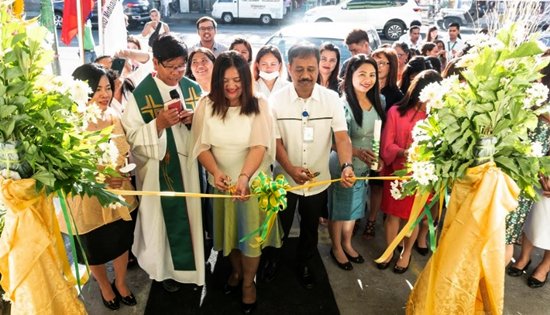
CARD
SME Bank opens newest branch in Bacoor City to serve mSMEs.
Leading the ribbon cutting ceremony are CARD SME Bank
President and CEO Aristeo A. Dequito and CARD MBA President
Flordeliza Cristobal. |
CARD thrift bank
opens 34th branch in Bacoor
By
CARD MRI Publishing
February 26, 2020
SAN PABLO CITY –
CARD SME Bank, a thrift bank under the CARD Mutually Reinforcing
Institutions opened its 34th branch in Bacoor City on February 24,
2020.
Establishing branches in
different parts of the country is one of CARD SME Bank’s key
strategies to make its products and services accessible to mSMEs or
micro, small, and medium enterprises and to other businesses and
individuals that may require them. “Expanding to Bacoor will enable
us to reach our goal of serving more mSMEs through our micro and SME
loan products. With each branch we open, we strive to provide
opportunities for aspiring entrepreneurs in the country to grow
their business and uplift their lives,” said CARD SME Bank President
and CEO Aristeo A. Dequito during the branch opening.
He also added that other
products and services of the bank such as savings accounts and
remittance will be available in the newly opened branch. “This is
our sixth branch in the province of Cavite. We have seen the
potential and development of our clients here and it’s the time to
respond closely to the growing needs of our microentrepreneur
clients,” Dequito concluded.
The branch opening was
also attended by CARD SME Bank Executive Vice President and COO
Cynthia B. Baldeo and CARD MBA President Flordeliza Cristobal. CARD
MRI clients and staff, representatives from the local government
unit, and other members of the community were also present.
Since its establishment in
2011, CARD SME Bank has a total of 975,070 clients with 319 offices
and 34 branches nationwide.
MARINA
re-accredits NMP courses
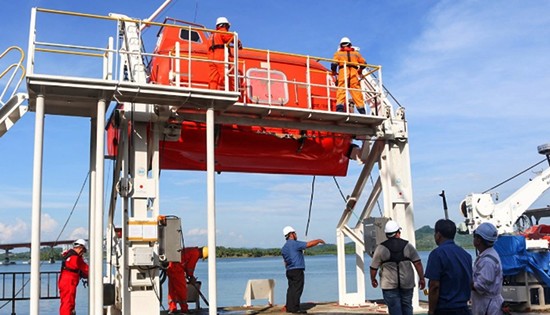
By
National Maritime
Polytechnic
February 25, 2020
TACLOBAN CITY – The
National Maritime Polytechnic (NMP), the sole government maritime
training and research center in the country consistent with its
mandate to provide maritime training and research that measure up to
international standards and respond to the needs of the Filipino
Seafarers and the industry, was re-accredited by the Maritime
Industry Authority (MARINA).
In a letter from MARINA
dated 04 February 2020 relative to the Notice of Accreditation,
NMP’s five (5) Standards of Training, Certification, and
Watchkeeping for Seafarers (STCW) courses namely: Rating's Forming
Part of a Navigational Watch (RFPNW), Medical First Aid (MEFA),
Survival Craft and Rescue Boats Other than Fast Rescue Boats (SCRB),
Refresher course on Survival Craft and Rescue Boats Other than Fast
Rescue Boats (RSCRB), and Global Maritime Distress and Safety System
(GMDSS) Radio Operators were granted full course approval for three
(3) years effective last 14 February 2020 which was the date of the
payment of accreditation and inspection fees.
The application for
renewal of NMP's courses were in accordance with MARINA Circular
2013-01 or the Rules on the Inspection and Accreditation of Maritime
Training Courses, STCW Circular 2018-02 or Standards for Mandatory
Training Courses Under The STCW Convention, 1978, as amended, and
STCW Advisory No. 2019-05 or Clarifications and Supplemental
Guidelines on the Implementation of STCW Circular No. 2018-02.
The said renewal approval
was a result of the site inspection conducted by MARINA last 04-08
November 2019 and the submitted course packages to the MARINA
Central Office on 21 February 2020 complying the above-mentioned
MARINA issuances.
Meanwhile, the other five
(5) courses in need of re-accreditation are scheduled for
re-inspection by MARINA to verify full compliance of the equipment
and facilities on 24-28 February 2020 namely: Basic Training (BT),
Refresher Course on Basic Training (RBT), Advance Fire Fighting (AFF),
Refresher Course on Advanced Fire Fighting (RAFF), and Ratings
Forming Part of a Watch in a Manned Engine-room or designated to
Perform Duties in a Periodically Unmanned Engine room (RFPNW).
Adherent to its priority
thrust on the quality, accessibility and relevance of training
programs and the responsiveness of its maritime researches, NMP
continues to upgrade its facilities and provide maritime trainings
required pursuant to the STCW Convention as amended in 2010
including value-adding courses towards improving the qualifications
of Filipino seafarers for their employment acceptability and
enhanced competitiveness. It also regularly conducts maritime
studies to come up with policies for the improvement of the manpower
sector of the industry.
Moreover, those interested
in NMP research undertakings may visit the NMP website (www.nmp.gov.ph)
and access the e-Research Information System Portal which is
designed to disseminate NMP completed researches, present the
Research Agenda and engage the industry stakeholders to collaborate
in the research activities.
For more information about
NMP trainings viewers may visit the agency’s facebook page (www.facebook.com/nmptrainingcenter)
where all related information on NMP trainings are available.
Likewise, for shortlisting on preferred training schedules, please
visit verify.nmp.gov.ph or download the NMP App on Google Play
Store.
Further, NMP encourages
OWWA registered seafarers to avail of the NMP-OWWA (Overseas Workers
Welfare Administration) Seafarers’ Upgrading Program (SUP) and
Skills for Employment Scholarship Program (SESP) which entitles the
beneficiary to receive financial assistance for training costs from
the OWWA.
NMP & PCGA
strengthen its tie-up
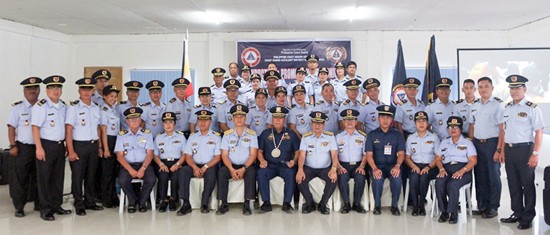
By
National Maritime
Polytechnic
February 23, 2020
TACLOBAN CITY – The
National Maritime Polytechnic (NMP) and Philippine Coast Guard
Auxiliary (PCGA) continue to strengthen its tie-up as the NMP
Executive Director, Joel B. Maglunsod was inducted as a new member
of the PCGA under the PCGA 11Ost Auxiliary Squadron last 09 February
2020 held at the NMP Maritime Training Annex Building, Cabalawan,
Tacloban City.
The said induction was led
by the Philippine Coast Guard District Eastern Visayas (CGDEV) Commo
Normando D Reyes PCG. It also highlighted the promotion of selected
NMP employees as officers of the PCGA.
Noteworthy that the
cooperation of NMP & PCGA started since 2012 as several NMP
employees were appointed to services of the PCGA per PCGDEV General
Orders Number 01 dated 24 April 2012. In the same manner, other
Directors of NMP were also members of the said auxiliary.
Similarly, on NMP's
conduct of Basic Safety Training for Motorboat Handlers/Operators
and Fisherfolks with Typhoon Preparedness (BSTMHOF) in coordination
with Local Government Units (LGU), the PCG acts as Resource Person/s
on topics: Debriefing and Marine Environment Protection that would
promote safety of life and property at sea.
Consequently, aligned with
the same mission of preserving the marine environment, NMP offers
the Consolidated Marine Pollution (MARPOL) 73/78, an STCW Mandated
course which discusses ways in minimizing pollution of the oceans
and seas including dumping, oil and air pollution among others.
Also in the objective to
provide officers and crew onboard the proper operation of the Oily
Water Separator (OWS), the said course is also offered by NMP to
ensure the preservation of the marine environment through the
complete elimination of pollution by oil per MARPOL regulations.
Through the years, the NMP
& PCGA tie-up preserved the vision and mission of the auxiliary – to
enhance coastal community relations and preserve the marine
environment through the conduct of coastal clean-up in various
places of the region and other activities adherent to being reliable
partners of the PCG.
The PCGA is a uniformed,
voluntary, non-government, non-political, service-oriented
organization established on 09 February 1972 whose membership adhere
to naval customs and traditions; to its organizational structure and
its own chain of leadership and management parallel to the PCG.
Further, the PCGA was
officially recognized under Section 11 of Republic Act Number 9993,
otherwise known as the PCG Law of 2009.
CARD SME Bank and
its digital banking transformation
By
CARD MRI
February 20, 2020
SAN PABLO CITY –
The CARD Mutually Reinforcing Institutions (CARD MRI) has always
been an advocate of financial inclusion. Throughout the years, it
has been providing Filipinos from the low-income sector with access
to financial services. As CARD MRI continues to explore new
innovations to reach the goal of poverty eradication, its thrift
bank – CARD SME Bank – is undergoing digital transformation to
provide reliable banking services.
Late last year, CARD SME
Bank introduced to its clients the konek2CARD mobile application
where they can do hassle-free banking transactions with the use of
android phones. Through this app, clients can monitor their savings
account, transfer funds, pay loans, check their transaction history,
and view mini statement, anytime and anywhere.
They can also do
self-initiated withdrawals from its Digital Cash Machine (DCM)
installed in their bank premises via a QR Code generated by the app.
A digital cash machine is a proprietary machine provided by the bank
for its clients.
Clients can also pay their
loans and withdraw their savings through konek2CARD agents located
in their barangays.
According to CARD SME Bank
President and CEO Aristeo A. Dequito, transforming the mindset of
people from traditional banking towards technology is difficult, but
the institution’s determination to provide its clients better
banking experiences is their utmost priority. This makes changing
the outlook of its clients in its digitalization efforts a top
priority.
“We know that introducing
a new technology may be challenging, but we assure them that these
innovations are of highest integrity and user-friendly. Our efforts
are now paying off as our clients are experiencing the efficiency of
these services,” said Dequito.
Digital banking through konek2CARD and Digital Cash Machine
Said CARD SME Bank client
Josefina Carpio, “konek2CARD initiative is really a good development
for the clients of the bank. Withdrawals are done faster. Another
good thing about konek2CARD is its convenient features like adding
mobile top-ups. We always have our smartphones with us anywhere we
go and konek2CARD is very convenient when we forget our ledgers or
ATM cards. We can always access our savings account, anytime and
anywhere. This mobile application is also very user-friendly.”
Carpio also encourages
other clients to use the mobile app for easier banking transactions.
The bank is initially
offering this service to its clients who are residing in
hard-to-reach areas to provide them access to their accounts and do
other transactions without going to the bank.
“Through these digital
transformations, CARD SME Bank clients can now work smarter as they
experience more efficient banking services,” said Dequito. These
digital revolutions can help clients decrease cost by not regularly
going to the bank and be more productive.
Its clients are more
satisfied with the fast and competent services rendered by the
banking institution.
“Through these efforts,
CARD SME Bank is pushing for digital financial inclusivity for all
so everyone can have access to affordable financial products and
services of CARD MRI,” Dequito concluded.
|
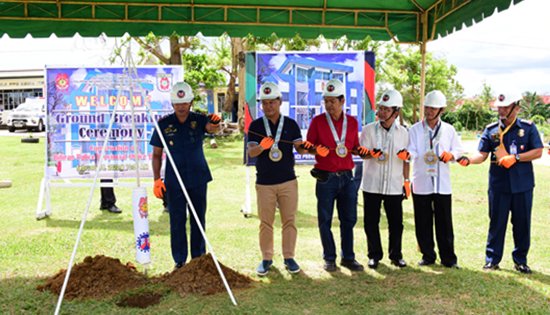
Photo
from left: PCol. Julius M. Coyme, Provincial Director, BPPO
lead the dropping of time capsule together with Hon. Brigido
Caneja III, Vice-Governor, Engr. Warlito Alagao, Proprietor
of W.B. Alagao Construction, Mr. Jesus Naquila, Provincial
Director DILG Biliran, Alfredo L. Bollido, Assistant
District Engineer of DPWH-Biliran DEO, PCol. Arnel Apud,
Regional Logistics, Research and Development Division and
PMaj. Aspiro Badiola, OIC, Regional Engineering Unit during
the groundbreaking ceremony for the construction of Biliran
Provincial Police Office Building on February 18, 2020 at
Brgy. Larrazabal, Naval, Biliran. |
PNP, DPWH lead
the groundbreaking ceremony for new Biliran Provincial Police Office
(BPPO) building
By
DPWH-Biliran
February 20, 2020
NAVAL, Biliran –
The Philippine National Police (PNP) Biliran Provincial Police
Office (BPPO) and the Department of Public Works and Highways (DEO)
Biliran District Engineering Office (DEO) lead the groundbreaking
ceremony for the new BPPO building on February 18, 2020 at Brgy.
Larrazabal, Naval Biliran.
“The new building is an
upgraded version of a standard police office building where the men
and women of BPPO will be housed to have more decent and presentable
police office,” said Police Colonel (PCol) Julius M. Coyme,
Provincial Director, BPPO.
Coyme revealed that the
construction of new building was realized because the assessment
conducted to the existing BPPO building tells that the building is
unstable for occupancy after the earthquake on April 23, 2018.
A total of P24.15M was
allotted by the DPWH in convergence with the PNP for the
construction of the three-storey new building which is expected to
be completed on November 06, 2020.
“The construction of this
new PNP building is a manifestation that BPPO is finally ready to
provide the public with the quality of service they rightfully
deserve,” said PCol. Marvin Manuel Pepino, Deputy Regional Director
for Administration in his speech delivered by PCol. Arnel Apud.
According to Pepino, the
new building will not only serve as a mere structure but it will
also signify as an avenue for community partnership and
stakeholders’ support.
“Having a conducive
workplace embedded with fully functional facilities is not only
bringing comfort for the personnel who will utilize such. It is also
highlighting the idea that the whole community will benefit in this
progressive cause,” Pepino said.
The ground breaking
ceremony was led by PCol Julius M. Coyme, Provincial Director, BPPO,
Alfredo Bollido, Assistant District Engineer for and in behalf of
David Adongay Jr., District Engineer of DPWH-Biliran DEO, Hon.
Brigido Caneja III, Vice-Governor representing Hon. Rogelio Espina,
Governor, Engr. Warlito Alagao, Proprietor of W.B. Alagao
Construction, Mr. Jesus Naquila, Provincial Director DILG Biliran,
PCol. Arnel Apud, Regional Logistics, Research and Development
Division and PMaj. Aspiro Badiola, OIC, Regional Engineering Unit.
Senate version of
CITIRA to help remove investor uncertainty - DTI chief
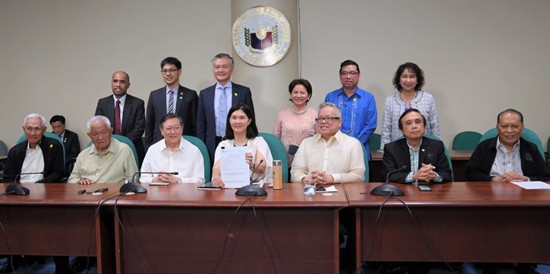
By
DTI-OSEC-PRU
February 20, 2020
PASAY – Department
of Trade and Industry (DTI) Secretary Ramon Lopez said that the tax
reform bill endorsed by the Senate Ways and Means Committee is a
well-balanced approach to the corporate tax reform and helps remove
the uncertainty of foreign investors.
On 19 February, Senator
Pia Cayetano sponsored Senate Bill No. 1357 also known as the
Corporate Income Tax and Incentives Rationalization (CITIRA).
Senator Cayetano, who heads the committee, is optimistic that the
Senate would approve the bill on final reading by March 13.
“DTI would like to thank
Senator Pia for sponsoring a bill that could create a better
investment climate for the greater majority. We think that this is a
well-balanced bill that enhances the incentives but will ensure
investment performance and efficiencies, with a systematic way of
rationalizing incentives,” said Sec. Lopez in a press conference.
“We appreciate this
version of the bill, and we hope for the immediate passing of the
bill to remove uncertainties and the wait-and-see attitude of
investors. We are now pushing for the passage of the bill to resume
the growth momentum of the country,” he added.
The CITIRA Bill, which
seeks to lower income tax rate from 30% to 20%, and modernize the
tax incentive system, is a priority bill of President Rodrigo R.
Duterte.
Since a bill on
rationalizing tax incentives was first proposed in 1995, the
Department of Finance (DOF) and DTI have urged Congress to finally
make this crucial reform happen.
“After a series of
consultations and meetings with various members of the government,
business community, and academe, and thorough consideration of the
sensitivities of key stakeholders, the new bill offers a more
reasonable transition period and one that gives recognition to high
performing investments such as being 100% exportation, or 10,000
jobs created or being in a highly competitive footloose industries”,
said Sec. Lopez.
Through the CITIRA, the
Philippines’ corporate income tax rate will be gradually reduced
from 30% to 20% over the next ten years, not far from the 17 to 25%
of its neighboring ASEAN countries.
The bill prioritizes
incentives of business activities that generate local employment,
promote development, innovation, high technology projects and
agribusiness, as well as those that invest in less developed areas
or communities recovering from disasters and conflicts.
The incentives provided
will be in accordance with the principles based on international
good practices to make it performance-based, targeted, time-bound,
and transparent.
|
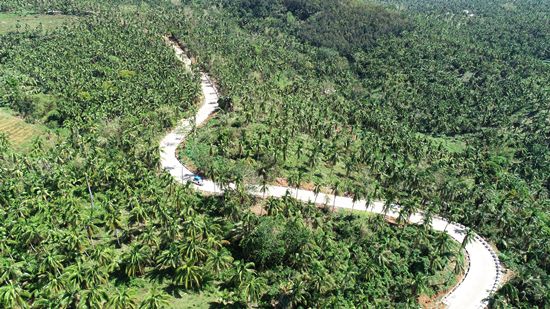
On-going
construction of access road leading to Bagongbong falls in
Brgy. Caucab, Almeria, Biliran under FY 2019 implementation. |
Access road to
Bagongbong Falls in Almeria, Biliran, 90% done
By
DPWH-Biliran
February 19, 2020
NAVAL, Biliran –
The on-going construction of access road at Brgy. Caucab in Almeria
town will pave a better road for local and foreign tourists going to
Bagongbong Falls when completed.
The Department of Public
Works and Highways (DPWH) Biliran District Engineering Office
reports 90% completion of the said project under FY 2019
implementation as of January 31, 2019 [sic].
The said project entails
the construction of a 0.51-kilometer two lane road concreting
including drainage structure at Brgy. Caucab road proper going to
Brgy. Upper Look with a contact amount of P18.7M.
David P. Adongay Jr.,
District Engineer said that the project is a multi-year
implementation from Fiscal Year (FY) 2018- 2020 in convergence with
the Department of Tourism (DOT) with a total length of
3.80-kilometer two lane road.
Under 2018 implementation,
the district office has already completed the 1.656-kilometer
two-lane road concreting from proper road of Brgy. Caucab going to
Bagongbong falls amounting to P44.7M.
Adongay revealed the
remaining 1.63-kilometer two-lane road concrete paving for FY 2020
implementation will be undertaken by the DPWH Regional Office with
an appropriation amount of P63.38M. The project will continue from
Brgy. Caucab road proper going to Brgy. Upper Look.
The road project also
leads to several agricultural farms in Brgy. Caucab including one of
the most visited mountain resort in the place which is the Bethany
Hills.
When completed, not only
the tourists, but also the residents and farmers will benefit this
road project,” said Adongay.
“From a bumpy and narrow
existing concrete road, they can enjoy a wider and convenient travel
and safer transport of their farm-produced goods,” Adongay added.
2-storey,
6-classroom facility replaces old school building in San Joaquin CES,
Calbayog City
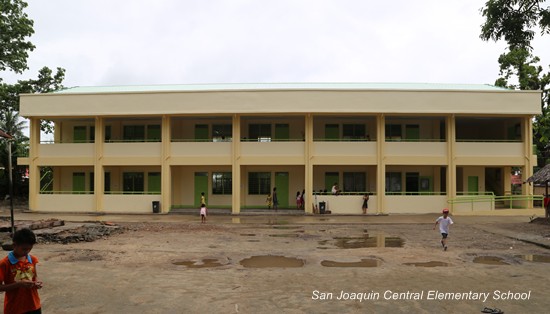
By
CHENZI MAY UY
February 18, 2020
CALBAYOG CITY –
Department of Public Works and Highways (DPWH), through its
convergence program with the Department of Education (DepEd), has
upgraded a dilapidated single-storey school building to a
two-storey, six-classroom learning facility in San Joaquin Central
Elementary School (SJCES) in Calbayog City.
The school building
project has an allocation of P18.57 million funded by the Basic
Educational Facilities Fund CY 2018 - Batch 3.
School Principal Michael
Pernia expressed his gratitude towards DepEd and DPWH for choosing
SJCES as a beneficiary of the school building program. “The
construction of this school building is very necessary [and] urgent
to San Joaquin, especially that this building has wide CRs and
spacious classrooms that follow specifications for the standard
classroom size,” Pernia said.
The new building is
currently occupied by Grades 1 and 2, consisting of around 210
students. With an average classroom size of 35, the young learners
of SJCES sit comfortably during class and focus better on their
lessons.
The rest of the students
in SJCES are occupying decades-old, Marcos-type buildings, some of
which are already subject for demolition. The school principal hopes
for these other structures to also be upgraded in the future, in
order to provide a safe and conducive learning environment for all
of their learners.